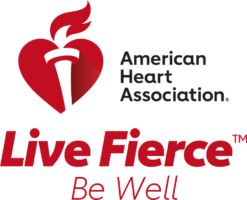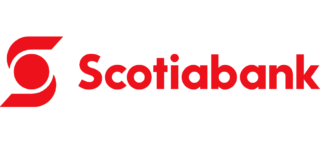
The American Heart Association is proud to announce that Scotiabank will serve as a supporter of the New York City Heart Challenge and the Wall Street Run & Heart Walk as the 2024 Live Fierce. Be Well. Sponsor! Through this relationship, we hope to further our mission and share resources to help improve the overall wellbeing of Scotiabank employees.
We spoke with a few Scotiabank employees to learn why they got involved in the AHA’s efforts and are participating in this year’s Wall Street Run & Heart Walk.
Live Fierce. Be Well. in New York City is sponsored by

Why I Walk
“My ‘Why’ is because running makes me feel good,” says Margo Hamner, Senior Manager, Finance Operational Risk Oversight Team, who has been with Scotiabank for over four years. Margo likes to run, and really enjoys doing it. It’s how she starts her day; running helps her release stress and gives her energy.
When Margo was at the Wall Street Run and Heart Walk event last year, she saw how many people were involved. It made her proud to be surrounded by almost 10,000 others, knowing she was a part of something big.
“When you’re passionate about something, and you see how many others are, too, it just makes it that much better,” she said of her experience at the 2023 Wall Street Run and Heart Walk.
“When those endorphins kick in, I am at my best,” Margo said. She encourages all Scotiabankers to get involved and participate to keep the momentum going. Margo shared that supporting the American Heart Association is a great effort from the Bank.

Peter’s nephew Henry, 11, will undergo his eighth heart surgery t
“My nephew Henry is my ‘Why’,” – Peter Gordon, Director, Equity Capital Market, who has been with Scotiabank for 12 years. Peter was inspired to join the Wall Street Run & Heart Walk because of his nephew, Henry. Henry was born with a congenital heart defect called Aortic Valve Stenosis. At age three, he had a Ross procedure, that swapped his pulmonary valve with his aortic valve. In 2020 Henry had a mechanical valve placed in his heart after which he earned the nick name “Super Henry”. Now, at age 11, Henry needs a stent to replace his pulmonary valve as he grows, which is done to reduce the reoperation rate in children and young adults. Peter believes it is so important to contribute to funding that advances medical procedures and technology, allowing medical professionals to execute surgeries, just like Henry’s, safely.
“These events are so important because it’s critical that we continue to fund saving children’s and adults’ lives,” Peter said. “Since he was born, Henry has had four open-heart surgeries, and this will be his eighth total surgery– at only 11 years old,” Peter said. The American Heart Association has invested over $5.7 billion in research since 1949. Click here to discover groundbreaking research funded by AHA.
Peter is extremely proud of Henry and shared that his young nephew’s dream is to become a doctor when he grows up. Henry wants to become a cardiologist, so that he can help kids like himself live longer, healthier lives. Peter emphasized that he admires his nephew, brother, and sister-in-law for having the strength to persevere through their heart journey.
“Participating in this campaign is very important to me. I walk for Super Henry: to let him know we’re all still thinking about him and to fund all the advances that go into heart surgeries like his,” Peter said.
“My Mom is my ‘Why’,” says Dana Lee, Manager, Governance, Policy & Strategy, Anti-Money Laundering at Scotiabank.
Dana Lee’s maternal family has a long history of heart disease. Her grandfather passed from a heart attack at an early age, and just last year, Dana’s mother passed following a heart attack. Dana says that her mother was relatively healthy: she saw her doctor regularly, she followed a good diet, and she exercised religiously. Yet, like many women, Dana’s mother’s concerns about her own cardiac health were minimized.
Women can have different symptoms and warning signs of heart attacks.
“Cardiac issues don’t always present in the textbook manner, especially for women. This is something I have been acutely aware of since I was a child. To know that my mom did all the things that we’re told we should do, and still have that outcome, is something that make me feel like there’s a gap in education and availability for more cardiac screenings,” Dana said.
Dana encourages more women, people of color and first-generation immigrants, like herself, to advocate for their health. Seeking out education and additional screenings that can help them be their own advocate.
“We don’t always have access to, or awareness of, these tests, to what they mean for us, and how to persuade our doctors that we need additional tests,” she said.
Dana will walk in the 2024 Wall Street Run & Heart Walk to spread awareness of the work that the American Heart Association does and to help increase funds to support the Association’s mission.
“I am proud to be a Scotiabanker, and I am proud to know that we are sponsors of the American Heart Association, because we all have a heart. The problem with heart health and heart disease is that it can happen to anyone,” Dana said.
Dana says that Financial Services can be a high-stress industry. Therefore, it is critical that we invest in the heart health of the entire Scotiabank community.
“I walk to encourage others to listen to their body” – Chloe Irons, Senior Manager, Internal Control at Scotiabank
Last year, Chloe experienced what felt like the symptoms of a heart attack: aching jaw, tingly face, trouble breathing, heart palpitations and numbness in her left arm. Despite recognizing these symptoms, her initial response wasn’t to go to the hospital, even though she knew that heart disease is the leading cause of death amongst women. It wasn’t until after her father & brother convinced her to get help that she took her symptoms seriously. Chloe then went to the hospital and discovered she had experienced a panic or anxiety attack, which can present similar symptoms to a heart attack. Chloe says, do not self-diagnose, if you experience symptoms of a heart attack, go to the hospital and get an EKG which can detect a heart attack. The earlier you detect a heart attack the greater the odds of a positive outcome.
Chloe has made many changes since her health scare, including carving out time in her schedule for physical activity. One of her favorite ways to incorporate movement is by walking her two dogs twice a day for 30-50 minutes. Chloe can feel the positive change reflected in both her physical and mental health. The American Heart Association recommends engaging in about 150 minutes (2.5 hours) of physical activity throughout the week, or about 30 minutes each day.
“Wellness has always been important to me. Making sure that you are physically, mentally, and emotionally healthy really helps you to bring your best self to work, and to be productive & collaborative. It creates a win-win for yourself and your organization,” Chloe says.
Chloe is also working on listening to her body by taking yoga classes and meditating. By learning how to press pause and take a break, Chloe feels more confident in her ability to identify the early signs of anxiety, and when it’s time to step away.
“Take a break, take a breath, go for a walk, and step away. By doing this, I have not had any more symptoms and have improved my own mental health. Give yourself a break, even if it’s just closing your eyes and taking three breaths,” Chloe said.
Explore more stories on health & wellbeing from Scotiabankers in the coming weeks.
To learn more about the NYC Heart Challenge and the Wall Street Run & Heart Walk on May 16, 2024.
If you want to share your story, please contact [email protected] or [email protected] .
